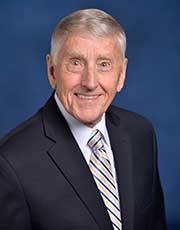D. Graeme Thomas: 1937-2024
08/20/2024
D. Graeme Thomas, former executive director of Saint Louis University’s Research Innovation Group, died Sunday, Aug. 11. He was 86.
Thomas joined SLU in 2011 as the director of the Office of Technology Management. That role changed in 2017 during an Office of the Vice President for Research reorganization, and Thomas became the executive director of Saint Louis University’s Research Innovation Group.

D. Graeme Thomas. SLU File Photo.
As the executive director, Thomas was responsible for commercializing the products of SLU research, including all aspects of IP protection, contract management, and industry collaboration.
Ray Tait, Ph.D., professor emeritus of psychiatry, was the Vice President of Research when Thomas joined SLU.
“When he was hired to run the Office of Technology Management, he inherited an office in disarray with little recognition among University faculty nor the St. Louis community at large,” Tait said. “Because of his prior work in the start-up community, he immediately brought recognition to the broader community. Due to the successful commercialization of research discoveries made by the SLU faculty, as well as his honesty, insightfulness, and humor (as well as some savvy hires), he earned recognition and respect within the SLU community, too. In short, OTM prospered under his leadership, benefiting both SLU and the broader community. He will be missed.”
While at SLU, Thomas assisted with the spin-out and support of numerous startup businesses based on SLU research and development. The businesses include startups engaged in the development of drugs for the treatment of fibrotic disease, (Indalo Therapeutics, Inc.,) for non-opioid pain relief (BioIntervene Inc.,) and for HSV and fungal infections and hepatitis B (Casterbridge Pharmaceuticals, Inc.).
Thomas was also engaged in the commercialization of drugs developed for use in the treatment of rare diseases including MPS VII enzyme deficiencies and FSHD muscular dystrophies, both licensed to an established, publicly listed, strategic licensee dedicated to the treatment of ultra-rare diseases.
Daniela Salvemini, Ph.D., the William Beaumont Professor and chair of the Department of Pharmacology and Physiology, professor in the Department of Psychiatry and Behavioral Neuroscience, and founding director of the Institute for Translational Science at SLU, worked closely with Thomas.
“Graeme was a close colleague and friend,” Salvemini said. “He supported our endeavors to commercialize our technologies, took a deep interest in the science behind the discoveries and contributed to our mission to discover new pain therapeutics that would help alleviate human suffering. Graeme was a kind man and will be terribly missed.”
Thomas led additional initiatives within SLU including the spin-out of a joint-venture CRO focused on PK/PD studies (Gateway Laboratories) in partnership with an executive of the former Center for World Health & Medicine (CWHM). He later led the repositioning within SLU of ongoing drug development programs formerly conducted within CWHM.
Thomas was also responsible for the promotion and expansion of the University’s sponsored research initiative, for the formation and management of a series of funded research innovation initiatives, and for the direction and oversight of MEDLaunch, SLU’s student-led, student-driven biomedical incubator.
“With his passing, we have lost a true gentleman and scholar, as well as a man with an ethical compass and an acute business sense,” Tait said.
Thomas was born Dec. 9, 1938, in Melbourne, Australia. He completed higher education at Melbourne, Macquarie and RMIT Universities.
Prior to joining the team at SLU, Thomas served in a variety of roles outside higher education. He had leadership roles at Sherwood Medical, MedAcscent Group, Akermin, and CardiaLen. It was that background that helped his work at SLU.
A memorial service is scheduled for Saturday, Sept. 14, 2024, at Kirk of the Hills Presbyterian Church in Town and Country. A visitation will be at 10 a.m. with services to follow at 11 a.m.
Latest Newslink
- SLU's Flying Billikens Taking Off for 2025 National Intercollegiate Flying CompetitionA team of aviation science students from Saint Louis University's School of Science and Engineering are heading to Oshkosh, Wisconsin this weekend for the 2025 National Intercollegiate Flying Association Competition.
- Lawrence F. Barmann, Ph.D.: 1932-2025Lawrence Francis Barmann, Ph.D., emeritus professor of American Studies, died April 25, 2025. He was 92.
- Patricia L. Monteleone, M.D.: 1935-2025Patricia L. Monteleone, M.D., dean emerita of the Saint Louis University School of Medicine, died Sunday, May 4, 2025. She was 89. A true trailblazer, Monteleone was the first female dean of Saint Louis University School of Medicine.
- SLU to Serve as Regional Summit Hub Host Site in National Event Around Health Care Workforce ReadinessOn Wednesday, May 21, the Saint Louis University Interprofessional Education Program, the Doisy College of Health Sciences, will host the fifth annual Regional Summit sponsored by the Association of Schools Advancing Health Professions.
- SLU Professors Recognized at 2025 St. Louis Theater Circle AwardsTwo Saint Louis University Theatre and Dance faculty members brought home awards at the 2025 St. Louis Theatre Circle Awards. Nancy Bell, professor of theatre, was awarded Outstanding Director of a Comedy for "As You Like It". The show also received Outstanding Production of a Comedy. Lucy Cashion, associate professor of theatre, directed "Romanov Family Yard Sale," which received Outstanding Ensemble in a Comedy.
- Saint Louis University's New Venture Accelerator Names Second CohortSaint Louis University's New Venture Accelerator (NVA), launched in 2024 out of the Chaifetz Center for Entrepreneurship, announces its second cohort of participants. The NVA offers current SLU students and alumni who have graduated within the last five years equity-free investments of up to $50,000 through a special accelerator fund created through donor support. In addition to financial support, the teams receive additional resources and mentoring from SLU experts.













